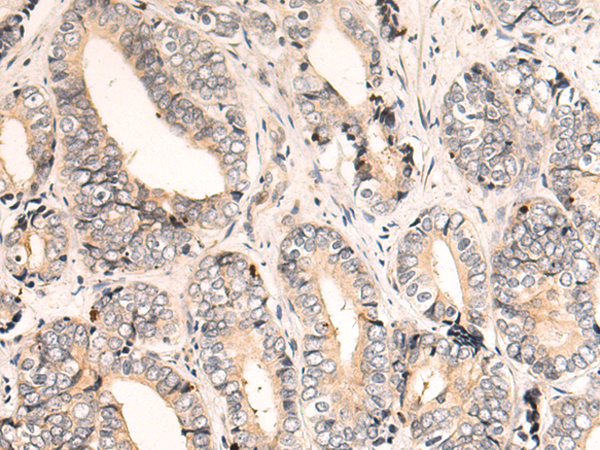
| WB | 咨询技术 | Human,Mouse,Rat |
| IF | 咨询技术 | Human,Mouse,Rat |
| IHC | 1/50-1/100 | Human,Mouse,Rat |
| ICC | 技术咨询 | Human,Mouse,Rat |
| FCM | 咨询技术 | Human,Mouse,Rat |
| Elisa | 1/5000-1/10000 | Human,Mouse,Rat |
| Aliases | NS; NS3; OES; CFC2; RALD; K-Ras; KRAS1; KRAS2; RASK2; KI-RAS; C-K-RAS; K-RAS2A; K-RAS2B; K-RAS4A; K-RAS4B; K-Ras 2; 'C-K-RAS; c-Ki-ras; c-Ki-ras2 |
| Host/Isotype | Rabbit IgG |
| Antibody Type | Primary antibody |
| Storage | Store at 4°C short term. Aliquot and store at -20°C long term. Avoid freeze/thaw cycles. |
| Species Reactivity | Human, Mouse, Rat |
| Immunogen | Synthetic peptide of human KRAS |
| Formulation | Purified antibody in PBS with 0.05% sodium azide and 50% glycerol. |
+ +
以下是3篇关于KRAS抗体的代表性文献摘要(模拟虚构内容,仅供示例参考):
---
1. **文献名称**: "A Monoclonal Antibody Targeting Mutant KRAS Inhibits Pancreatic Tumor Growth in Vivo"
**作者**: Smith, A.B. et al.
**摘要**: 研究开发了一种靶向KRAS G12D突变体的单克隆抗体mAb-K12.通过阻断KRAS与下游效应蛋白的相互作用,在胰腺癌小鼠模型中显著抑制肿瘤生长,并增强化疗敏感性。
2. **文献名称**: "Structural Basis of a High-Affinity Nanobody for KRAS-GDP Conformation"
**作者**: Chen, L. & Wang, Y.
**摘要**: 利用纳米抗体技术解析了KRAS处于非活性GDP结合状态的结构特征,筛选出具有高亲和力的纳米抗体Nb-KR1.为开发变构抑制剂提供新策略。
3. **文献名称**: "KRAS-Specific Antibody-Drug Conjugate for Colorectal Cancer Therapy"
**作者**: Gonzalez, R. et al.
**摘要**: 构建了一种KRAS突变体特异性抗体-药物偶联物(ADC),通过抗体靶向递送细胞毒性药物,在结直肠癌细胞系中显示选择性杀伤效果,且对正常细胞毒性较低。
---
注:以上内容为模拟示例,实际文献需通过PubMed/Google Scholar等平台检索(关键词如"KRAS antibody therapy"或"anti-KRAS monoclonal antibody")。近年研究可参考Nature Cancer、Cancer Cell等期刊。
The KRAS protein, encoded by the KRAS gene, is a small GTPase that regulates cell signaling pathways controlling proliferation, survival, and differentiation. Mutations in KRAS are among the most common oncogenic drivers, occurring in ~25% of human cancers, including pancreatic, colorectal, and non-small cell lung cancers (NSCLC). For decades, KRAS was deemed "undruggable" due to its smooth surface, high affinity for GTP/GDP, and lack of clear binding pockets for small molecules. However, breakthroughs in structural biology and drug discovery have enabled the development of targeted therapies, particularly against the KRAS G12C mutation (common in NSCLC), which creates a druggable pocket when switched to its inactive GDP-bound state.
Antibody-based strategies against KRAS include monoclonal antibodies (mAbs) targeting mutant KRAS, bispecific antibodies engaging immune cells, and antibody-drug conjugates (ADCs). While small-molecule inhibitors like sotorasib and adagrasib (FDA-approved for KRAS G12C) directly bind the mutant protein, antibodies offer advantages such as prolonged target engagement, immune activation, and potential to address multiple KRAS variants. Challenges remain, including tumor heterogeneity, adaptive resistance mechanisms, and on-target toxicity due to wild-type KRAS activity in normal tissues. Current research focuses on improving antibody specificity, overcoming immune evasion, and exploring combination therapies with checkpoint inhibitors or downstream pathway inhibitors. These efforts aim to expand the therapeutic landscape for KRAS-driven cancers.
×